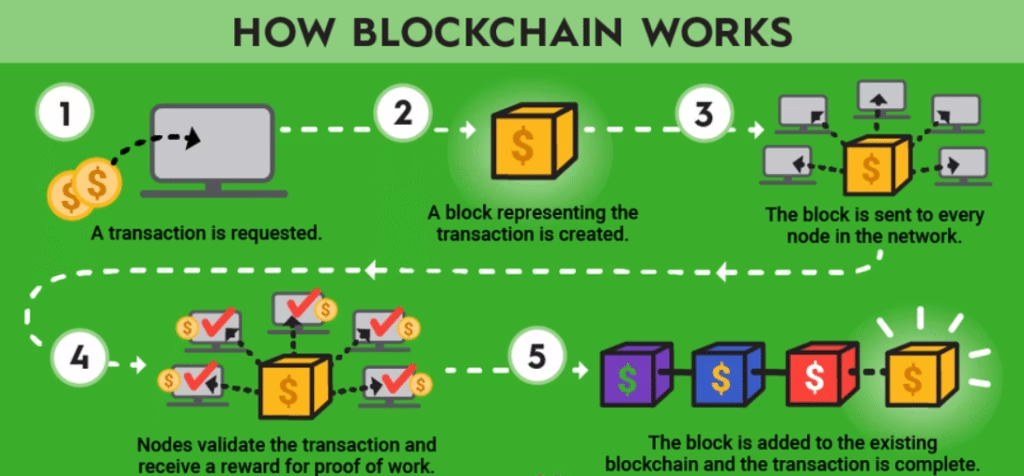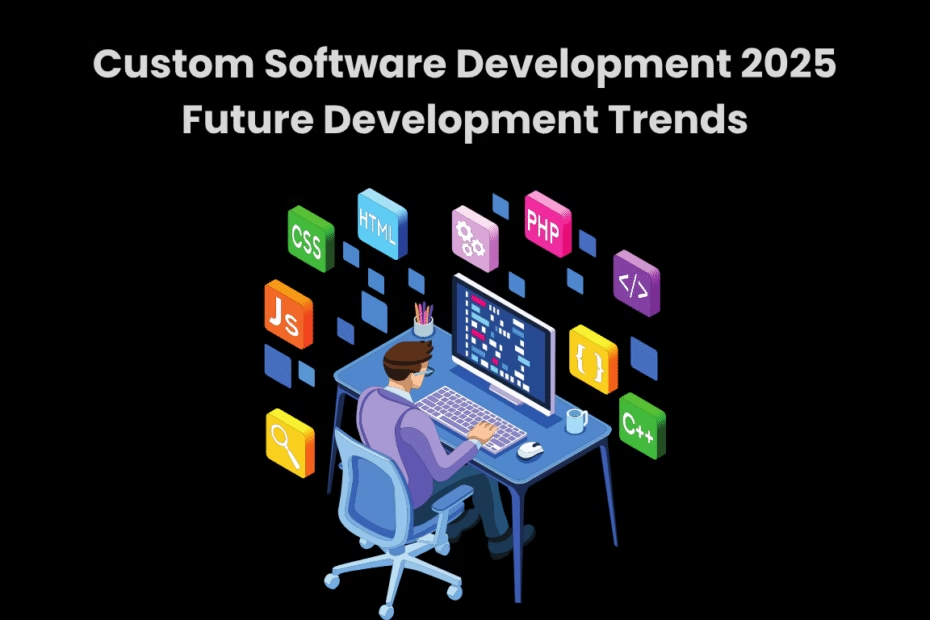The Future of Custom Software Development: Trends for 2025
Technologies change, and business needs evolve. Therefore, custom software is outdated. The development of custom software is rather bright in the future. Only a dedicated, special-purpose custom software development company provides such specific services. Based on some analysis, it can identify its basic characteristics. Enhancing its value proposition to ensure the safety of business operations. Success in today’s business is predicated on a company’s understanding of technology and innovation. This article explains how new technologies are helping businesses to become more competitive and innovative.

Predictions for the Development of Customized Software in the Future: 2025
The following are the expectations for customizing software in 2025:
Automation and Artificial Intelligence
The new platform of custom enterprise software development will incorporate AI for automation. This platform will include logic-based programs. This module also acts as a designer and bug fixer, as well as a tuner for the best performance. This means that a business can run with less trouble and be more effective. By 2025, we can expect the following:
- Those will use more AI-driven tools for code generation.
- Generation of improved testing capacities with the assistance of AI algorithms.
- Make the project management process more efficient with the help of predictive analytics agencies.
Low-code and No-code Development
This facilitates the development of applications by those who are not developers. Custom software development for startups helps them launch promptly with fewer coding skills from them. Many businesses engage a Software Development Company or opt for custom software development services USA to access frameworks, tools, and best practices that ensure these applications are built robustly and maintainably. A reliable software development company can provide the tools and expertise needed to bring ideas to life efficiently. Key advantages include:
- Quick app delivery: It accelerates app development through rapid prototyping and Mobile app deployment companies.
- Reduce dependence on IT commands: Business users own their projects, thereby creating fewer bottlenecks.
- Empower business users: As an IT solution provider, IT no longer needs to wait for the next release of the product or service to innovate and meet business needs by leveraging non-technical staff.
The platforms are changing the way organizations create software. It is improving the ability to develop and be agile.
Cloud Computing and Serverless Architectures
Custom software development company are increasingly cloud-based. You can build apps using serverless architectures without managing the infrastructure. Its benefits include:
- It is cost-efficient: This saves so much overhead. Businesses only pay for what they will use. They can change it whenever needed.
- It is Scalable: It allows applications to scale in varying workloads with sufficient performance.
- Simplified deployment: One of the benefits is that now processes are faster. This speeds up deployments and updates, hence boosting productivity.
The development of enterprise custom Utilities Software is evolving with cloud solutions. Some of the benefits will be very important in the future. They make the sector innovative and effective.
Increased Security Measures
It is a matter of fact that custom software design for startups and its security has become all the more paramount, making the use of a robust Test Management Platform essential for maintaining code quality and streamlining development cycles. It has emerged to be a prime factor for both startup companies and existing businesses. This heightened focus on security is equally evident in industries like insurance, where businesses often rely on specialized insurance software development services to ensure compliance and protect sensitive data. Some of the crucial trends driving this move are as follows:
- Adoption of zero trust security models: It ensures, by default, that no user is trustworthy, and access control is improved.
- DevSecOps: Security in the software development custom process.
- Safe encryption and increased use of coding practices: Ensures that confidential data remains protected from unknown persons.
A study on cybercrime by Cybersecurity Ventures foresees cybercrime reaching $10.5 trillion a year by 2025. This is a call to have strong security measures.
Blockchain Technology
The tech behind the blockchain has moved out quickly from its crypto roots. Now, it is widely used for applications today, such as in the supply chain and for digital identity verification. Top custom software development companies take hold of blockchain’s potential in transforming the industry.
- Increased transparency and traceability: Blockchain offers an unchangeable ledger that records as it happens, tracking perfect accountability with assets and transactions.
- Better transaction security: Blockchain is decentralized, meaning data changes require approval from the network. This enhances safety and is a core benefit offered through professional Blockchain Development Services.
- Decentralized applications (dApps): There is no central authority; they run. With this, users have better control and are less dependent on intermediaries.
Blockchain is key to future software as businesses seek these benefits.

Green Computing
Today, green computing is a significant trend. It seeks to make its approach environmentally friendly. The way we generate data cannot be kept up with through the traditional computing methods we are always undertaking. The basics of Green Computing are as follows:
- Energy efficiency: Reduce energy usage through efficient hardware and software. For example, there are certain coding techniques that will make it more productive. They use lesser amounts of energy.
- Sustainable Data Centers: They like renewable cloud providers. They also demand effective cooling mechanisms. Their target is to decrease their carbon footprint.
- Regulatory compliance: Businesses must adapt their IT to meet stricter environmental laws. It will be a part of the direction of sustainable development achievement.
Organizations going green with their IT also have an impact on the environment. They can also boost efficiency by implementing the following strategies:
| Key Strategy | Description |
| Energy-Efficient Hardware | Invest in Energy Star-rated devices to minimize power consumption and heat. |
| Virtualization | Optimize hardware usage by consolidating servers and reducing energy consumption. |
| Renewable Energy | Use renewable sources of energy for the data centers to reduce carbon footprint. |
| Green Coding Practices | Adopt efficient coding practices to lower energy consumption in software. |
| E-Waste Recycling | Promote responsible recycling of electronic waste that reduces the environmental impact. |
Extended Reality (XR) technologies
Virtual Reality (VR) and Augmented Reality (AR) make up Extended Reality (XR). In healthcare and education, for example, it’s growing fast. Custom software design companies are using XR technologies to achieve key goals:
- Enhance Training Programs: XR’s core is immersive experiences. They improve learning and retention.
- Improve remote collaboration: Teams can work together in virtual spaces, no matter where they are.
- Use XR tech in retail: Making customers feel important generates interest and builds sales.
As XR grows, it will take on more uses. It is a very vital tool for businesses. It could enhance user involvement and encourage innovation.
API-First Development
For scalability, apps need to interact more. An API-first approach is now vital. However, this strategy lets the custom software firm develop modular applications. These apps can be easily integrated with other services. Key benefits include:
- Faster development cycles: All this leads to faster feature updates and releases.
- Better collaboration: Shared APIs help teams communicate and coordinate, increasing efficiency.
- More flexibility: Companies will respond fast to new needs. Other than that, they can also use new technologies without having to change their current systems.
By working with APIs in development, organizations can build strong, flexible software that’s ready for the future. This approach not only boosts efficiency but also sparks innovation in today’s digital world, especially in areas like Market Making Software, where speed and adaptability are key.
Read More: The Role of AI in Modern Software Development
Conclusion
All around, custom software development is changing very quickly due to technology. The future is promising. By advancing AI, low-code platforms and blockchain businesses will be successful up until 2025. However, these innovations will only be harnessed if businesses partner with leading software developers. Such trends help organizations keep competitive in a digital world. Using green IT keeps a positive impact on the planet and increases efficiency. Furthermore, it sanctions new regulations.

